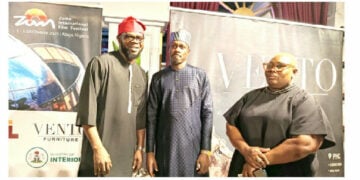Experts have said the African creative industry can gain a boost from joint Intellectual Property (IP) ownership of creative works and a unified fight against piracy.
IP and Entertainment lawyer, Carla Parris, Australian serial entrepreneur and co-founder Yakwetu Online, Mike Strano, and founder, Opus Music Africa, David Tayebwa made this known at a virtual webinar titled ‘Africa Creative Economy: Mainstreaming IP and Music Into Intra-African Trade Webinar’.
According to Parris while Caribbean and Africa countries generate millions of revenues via its vast array of colourful carnivals – it forfeits billions of dollars revenue it could earn in IP. In a study conducted by Parris of carnivals from (2018 – 2021) across the world, revealed that very little is known about IP law amongst creatives and business entities that support them. This is because focus remains solely on performance, not ownership or monetisation.
In 2024, revenues earned from carnival performances in Parris’ native Trinidad and Tobago, amounts to $640m Trinidad and Tobago dollars, that is $94. 2m US dollars, paled to the economic contribution of copyright-based industries in the country in 2012, which stood at TT $1.988m (US $294.3m) according to a WIPO report.
Strano, on the other hand, reports economic losses resulting from piracy to the Kenyan economy at $800m.
“With a country the size of Nigeria, which is four times the size of Kenya, piracy cost to the economy runs into billions of dollars.”
To ensure an African creative economy that can sustain the livelihood of its creatives, particularly in an increasingly globalized and digital world, and within Intra Africa Trade Area, both Parris and Strano urged for an intentional discuss between African governments and African creatives, on shared ownership Ips for creative works, and a united battle against piracy via African creatives membership in the Partners Against Piracy (PAP) association.
Presently, Parris said absence of copyrighted or IP protection on original songs, performances, costumes, logos, event branding, wearable arts used in the Caribbean and African carnivals make it difficult for creatives to claim or generate royalties and revenues for their work. Same as ineffective and absence of written contracts between creatives – for instance, a carnival costume designer and a band leader.
“What happens is that they lose rights over how their works should be used. They also lose distribution deals because no one wants to enter a contract with a liability-risk creative.”
The bridge Africa and ensure beneficial trade and cross border collaborations, “there should be clear joint ventures between African and Caribbean creatives. This should be done with intentionality. Beyond talk-shop, intentional discussions should be held on how to approach joint ownership of works.
“We can look at things like PAN African IP managing offices, fund joint innovation hubs, cross border licensing, joint IP goals, bilateral and multi-lateral agreements etc. basically, we have to think pragmatically how to achieve joint ownership of creative properties,” said Parris.
For Strano, creatives should lend their voice to the fight against piracy, through PAP, as the causes fought on the platform benefits them.
A united voice, he said, can help in addressing issues like the US-founded Cloudflare, which London-based data collection company, MUSO, discovered routes 85% of the 250 global piracy sites.
“We don’t get the support needed from creatives in the protection of their rights,” said Strano. He, however, urged that creatives willing to learn about their IP and the creative rights, to lend their voice and action against piracy can access free training on IP and capacity building on WIPO websites.





